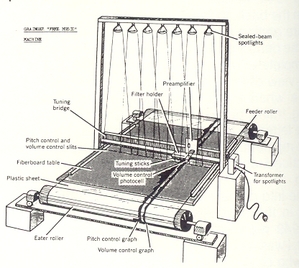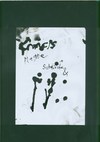
Blog : Percy Grainger - The Quest For A Free Music
Percy Grainger - The Quest for a Free Music
##Artefacts Communique 2##
Artefacts of Australian Experimental Music: 1930 – 1973 is a landmark compilation CD documenting the forgotten pioneers of Australian music. For full details, track listing and audio samples, go to http://ShameFileMusic.com
Percy Grainger – The Quest for a Free Music
In the early 20th century, Percy Grainger was the equivalent of an international pop star. Famed as a composer and pianist, Grainger was also a collector of folk music, as well as an eccentric interested in sado-masochism. He was also the first Australian to record a significant body of experimental music.
In the early 1920s he worked with cutting player piano rolls by hand to enable his complex compositions to be played. His work with Free Music took place in the late 1940s and 1950s, but the idea had been developing throughout his life. A young Grainger, boating on Melbourne's Albert Park Lake, observed the waves lapping against the side of the boat led him to wonder why music couldn't have the same continuous motion.
The central idea of Free Music was the concept of a "gliding tone". He worked with Leon Theremin and his theremins in the 1930s to realise the idea, but Theremin returned to Russia in the late 1930s and Grainger was frustrated with the lack of control he had over the pitch of the theremin. His desire for more precise pitch control led him to work with physicist and engineer Burnett Cross to construct devices that could produce the gliding tones Grainger envisioned.
Cross recalled that Grainger was on a lifelong search to explore this unknown territory, and he was impressed by the composer's persistence in his quest. Many people didn't understand what Grainger was trying to achieve, and some even questioned his mental stability. Later in life, Grainger became somewhat socially isolated in the conservative Australia of the 1950s. Keith Humble suggested that Grainger, who he saw as the most radical and significant musician Australia had ever produced, be commissioned to write a music for the opening of the Melbourne Olympic Games in 1956, but the idea was treated with scorn. Grainger died in 1961, and it has only been in more recent times that some appreciation of what Grainger attempted to achieve with his Free Music experiments has begun to emerge.
Some of Grainger's Free Music recordings have been released elsewhere, but "Free Music (Reed Box – Top and Bottom Ranks – Thick)" is presented for the first time on Artefacts of Australian Experimental Music: 1930 – 1973. Recorded in 1951, the piece is a riot of tone clusters produced by a re-tuned reed organ and hand-cut paper rolls. The voice at the beginning of the recording is Howard Cross (brother of Burnett). The rolls were cranked by hand, using variations in speed and direction. This astounding recording is power electronics/noise from 1951! Warren Burt has said that he likes to play this to people who only know Grainger for his composition English Country Garden and watch their reaction.
Pre-order your copy of Artefacts of Australian Experimental Music: 1930 – 1973 compilation CD for the special price of AU$23ppd (US$17.30ppd) from http://ShameFileMusic.com . This special deal is only available for 2 more weeks. Look out for launch events at this year's Liquid Architecture Festival in both Melbourne and Brisbane.
Added by shamefile on 24 June 2007
Page:


